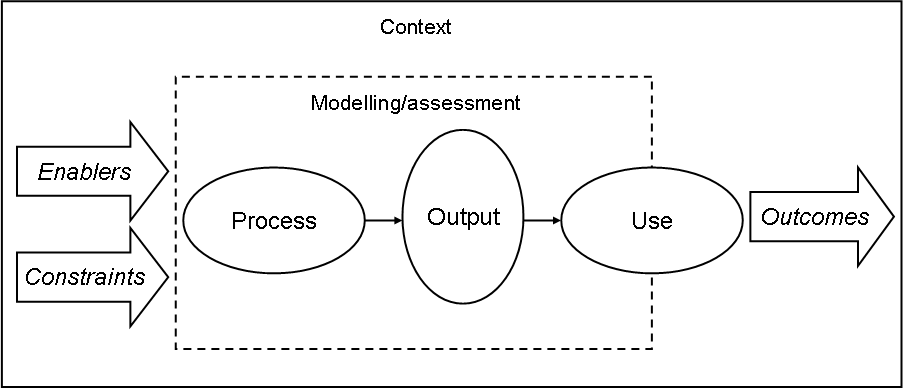Societal context of assessments
This page is a encyclopedia article.
The page identifier is Op_en2083 |
|---|
| Moderator:Nobody (see all) Click here to sign up. |
|
|
| Upload data
|
The basic idea in the practice of assessment, be it risk, impact, integrated, health impact, integrated environmental health impact, or whatever assessment, is to use the means and methods of science to support societal decision making. It aims to prevent random decisions, as in flipism, but also decisions based on incomplete, biased or false information, as well as decisions founded on societally unacceptable values, especially when these decisions address important matters.
Here assessments considered in relation to the field of environmental health, for example in the form of integrated environmental health impact assessments (IEHIA). Most of the content is however generalizable to any kinds of assessments in any field serving as science-based decision support to societal decision making.
Environmental health assessment (EHA) is an endeavour of analysing the relations between environmental phenomena and human health. The purpose of this is to support societal decision making upon actions to control the environmental phenomena or human behaviour in such a way that the adverse impacts are reduced while beneficial impacts are promoted. EHA's may come in many forms and under several titles, e.g. risk assessment (RA), health impact assessment (HIA), environmental impact assessment (EIA), integrated assessment (IA), integrated environmental health impact assessment (IEHIA), benefit-risk analysis (BRA), and cost-effectiveness analysis (CEA) just to mention a few. The name of the chosen approach is not important. What counts in whether a particular assessment is to be categorized under the relatively broad title of EHA is if it conforms to the following overarching elements of EHA's:
- The purpose is to provide answers to practical questions regarding societal needs, and thereby enable actions that effectively promote societal good.
- The answers to the questions are sought for by means of systematic analysis applying scientific knowledge, means and methods.
- The target of analysis is relevant to environment and health.
- The approach in the analysis is such that it reveals and compares the impacts of decisions and actions that are known to be possible options to be undertaken.
As both environment and health are very broad concepts, EHA is by its nature a multi-disciplinary field of practice and it addresses issues that are of at least potential interest to a great number of people having different perspectives. Naturally this includes all the scientific experts appointed to make the assessment task and the policy makers having an obligation to deal with the particular issue at hand, but also representatives of industry and commerce, NGO's and the general public e.g. as consumers or citizens. EHA can thus be perceived as a science-based activity that takes place on the interface between science and society, bridges scientific knowledge and practice with the practical needs of e.g. policy, business and everyday life, thereby providing enlightenment and increased awareness within the society at large.
- Risk assessments should always be done for a purpose. When the purpose is identified and kept clear in mind and preferably explicated and made public, it helps to guide the process in producing a desired kind of assessment product. The primary purpose is to improve societal decision making by providing good descriptions of chosen parts of reality for the use of the decision-makers. Proper identification of the purpose of risk assessment crucially affects the assessment process and the content and essence of the final product.
- Context of policy (universal)
- Kind of physical and social environment in which societal decision-making takes place. This object contains the common properties of all possible contexts of policies.
- Context of policy
- The physical and social environment in which a particular societal decision-making situation takes place.
- Context of science (universal)
- Scientific information and understanding from all disciplines, including natural sciences, health sciences, environmental sciences, and economy. This object contains the common properties of all scientific contexts in different cultures and at different times.
- Context of science
- Scientific information and understaning from all disciplines, including natural sciences, health sciences, environmental sciences, and economy. This object contains the current scientific context in the western culture.
- Assessment (universal)
- Kind of a formal description of available information that intends to help societal decision-making. This object contains the common properties shared by all assessments.
- Assessment
- A formal description of available information that intends to help societal decision-making in a particular situation. The assessment has a particular format that is common to this type of assessments. In practice, the format of an assessment depends on the available assessment frameworks. However, it is important to notice that the needs of the assessment drives the contents of the framework and not vice versa. If a proper framework for a particular assessment does not exist, it must be developed.
- Assessment framework (universal)
- a kind of a process that leads to the production of assessments. This contains the common properties of all possible assessment processes. The discussion about which assessment framework should be used in which kind of situations belongs into this object.
- Assessment framework
- A process that leads to the production of an assessment. The selection of an actual assessment framework depends on both the universal assessment framework and the particular assessment (product) that is to be produced. Examples of assessment methods include
- traditional risk assessment framework (RA)
- health impact assessment framework (HIA)
- benefit-cost analysis framework (BCA) or cost-benefit analysis framework (CBA) R↻
- cost effectiveness analysis framework (CEA)
- open assessment framework (OPAS)
- impact pathway approach (e.g. in ExternE)
- Intarese assessment framework.
